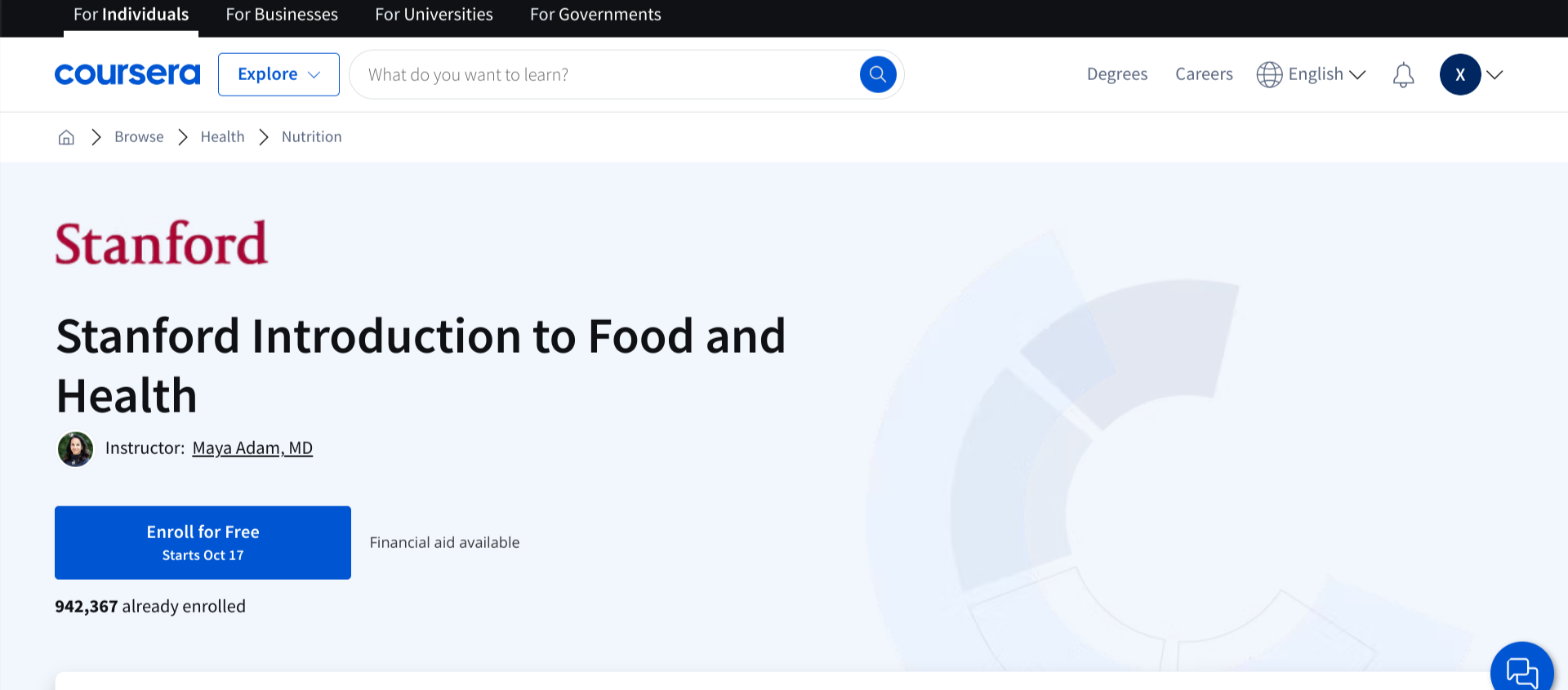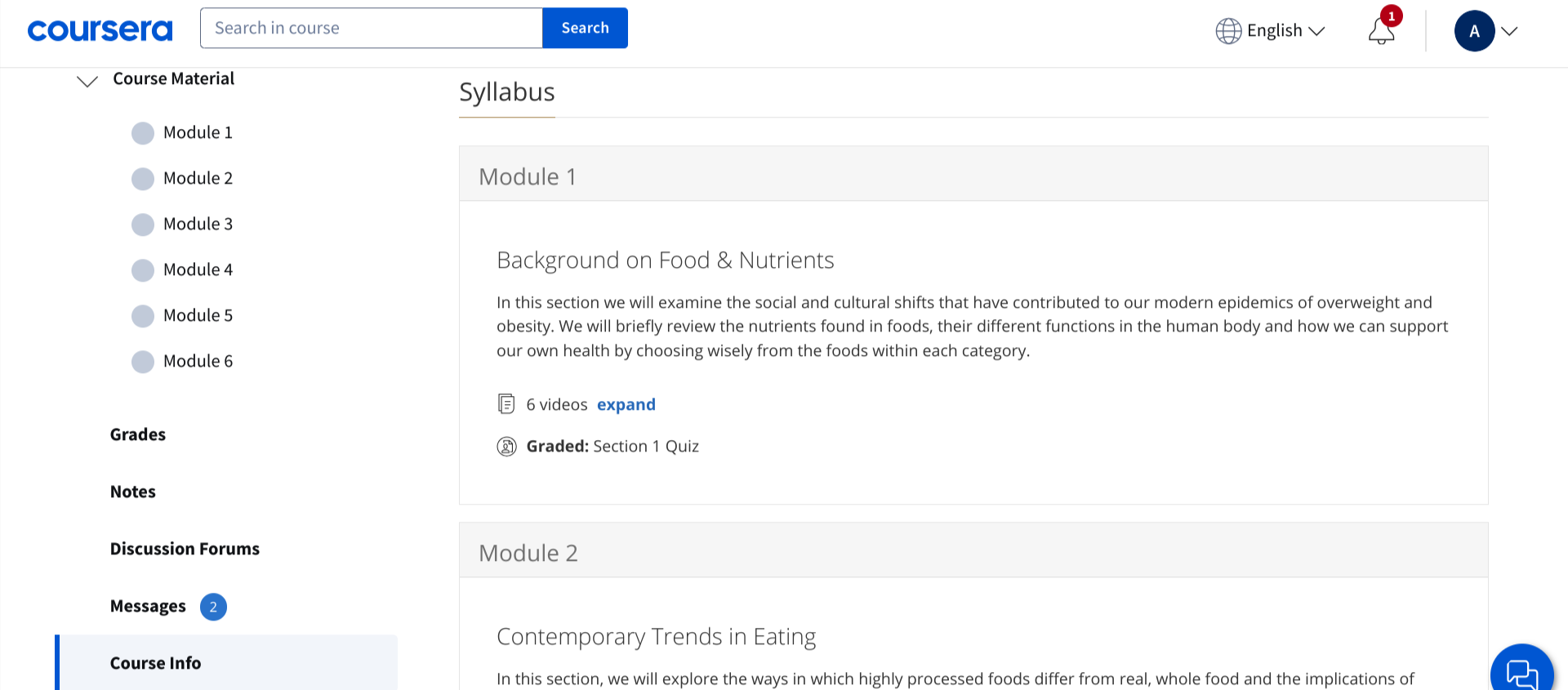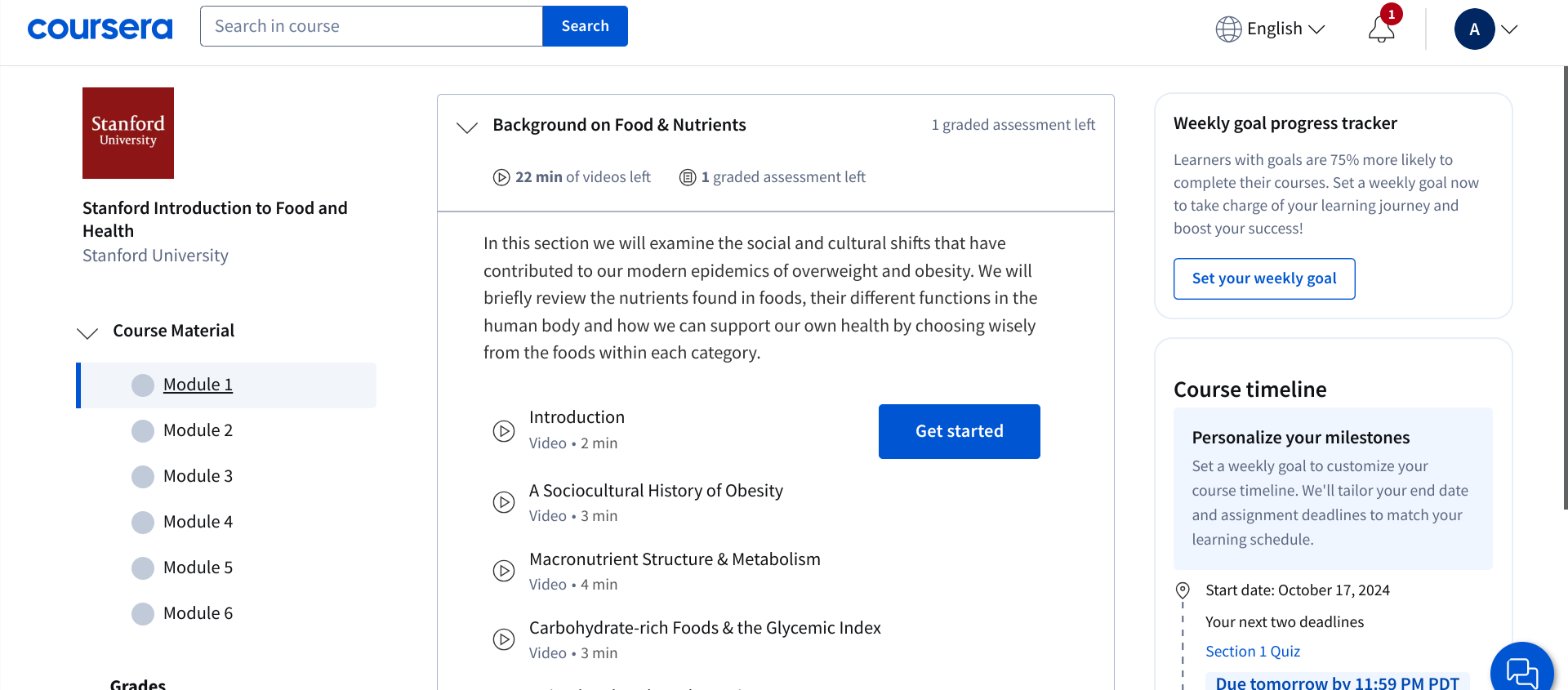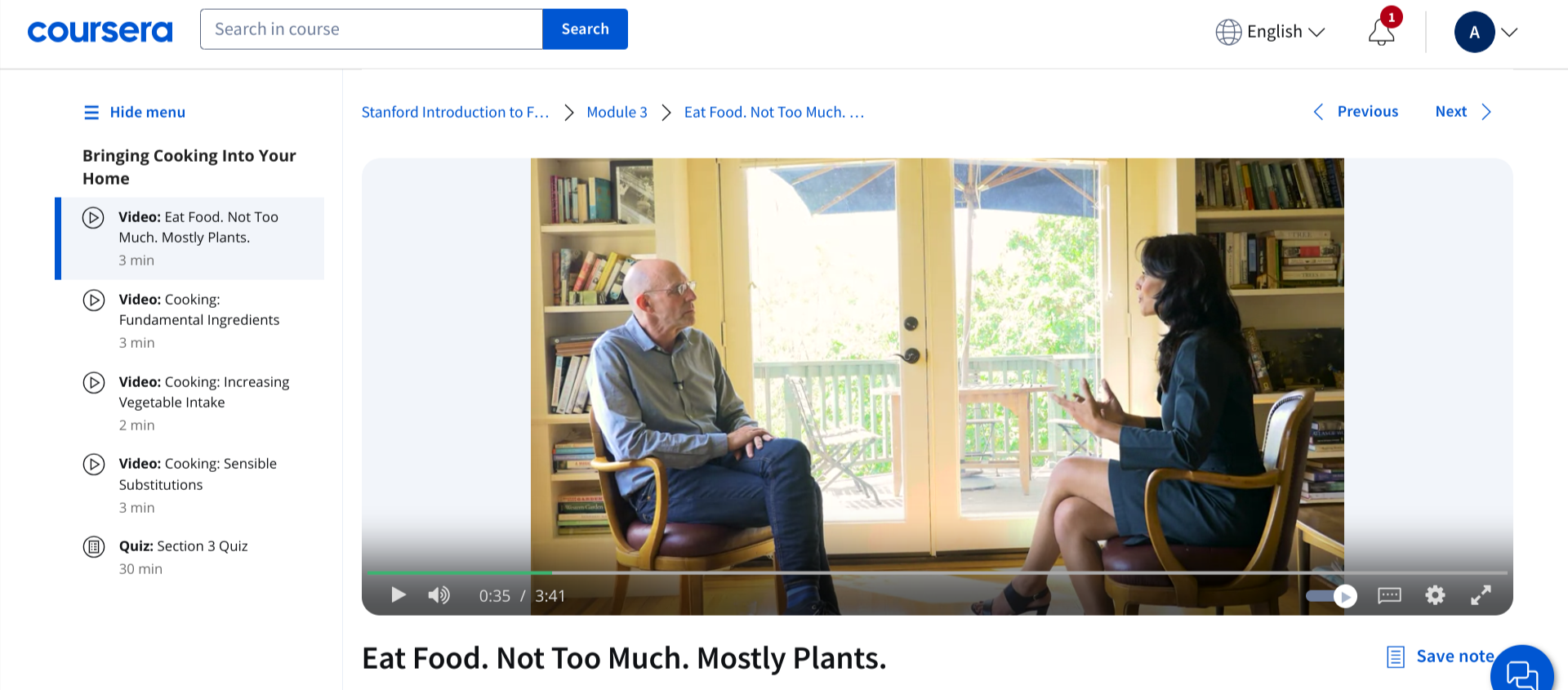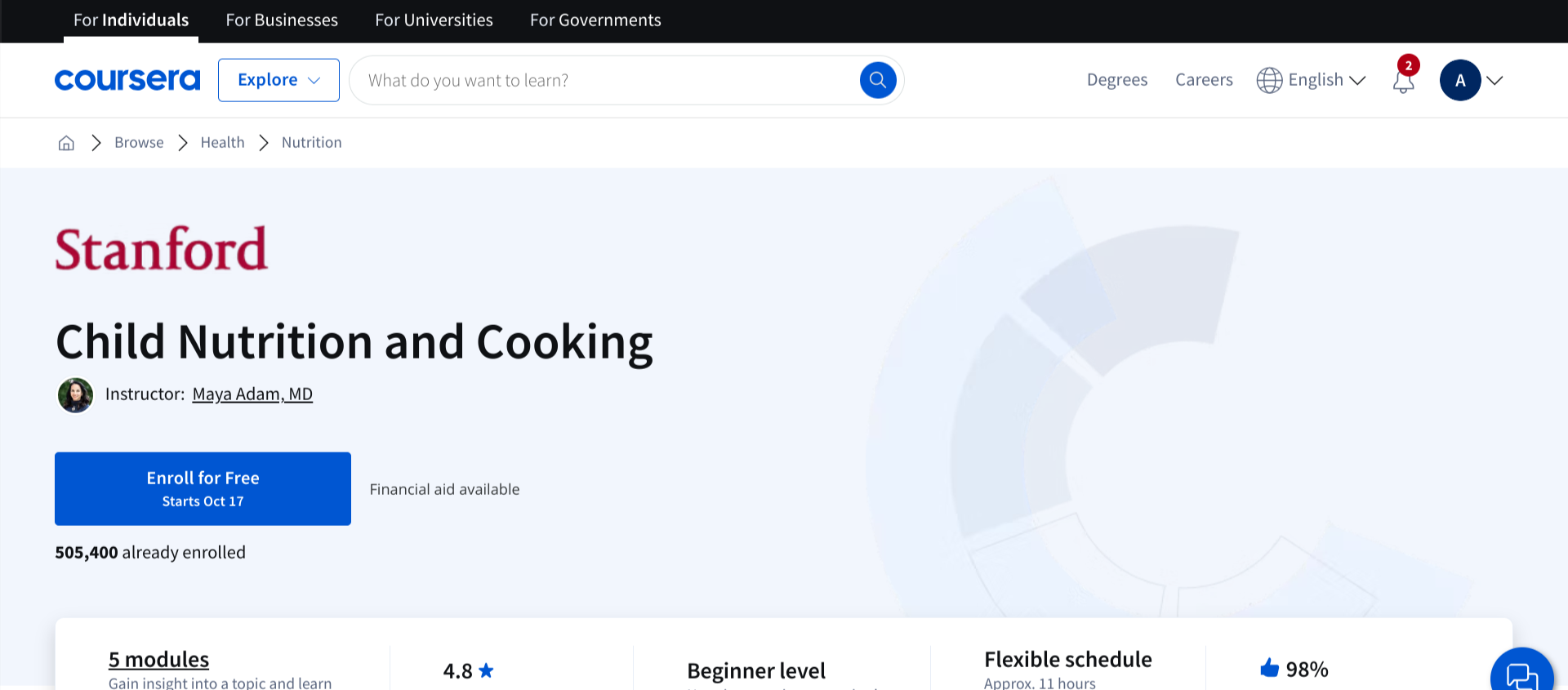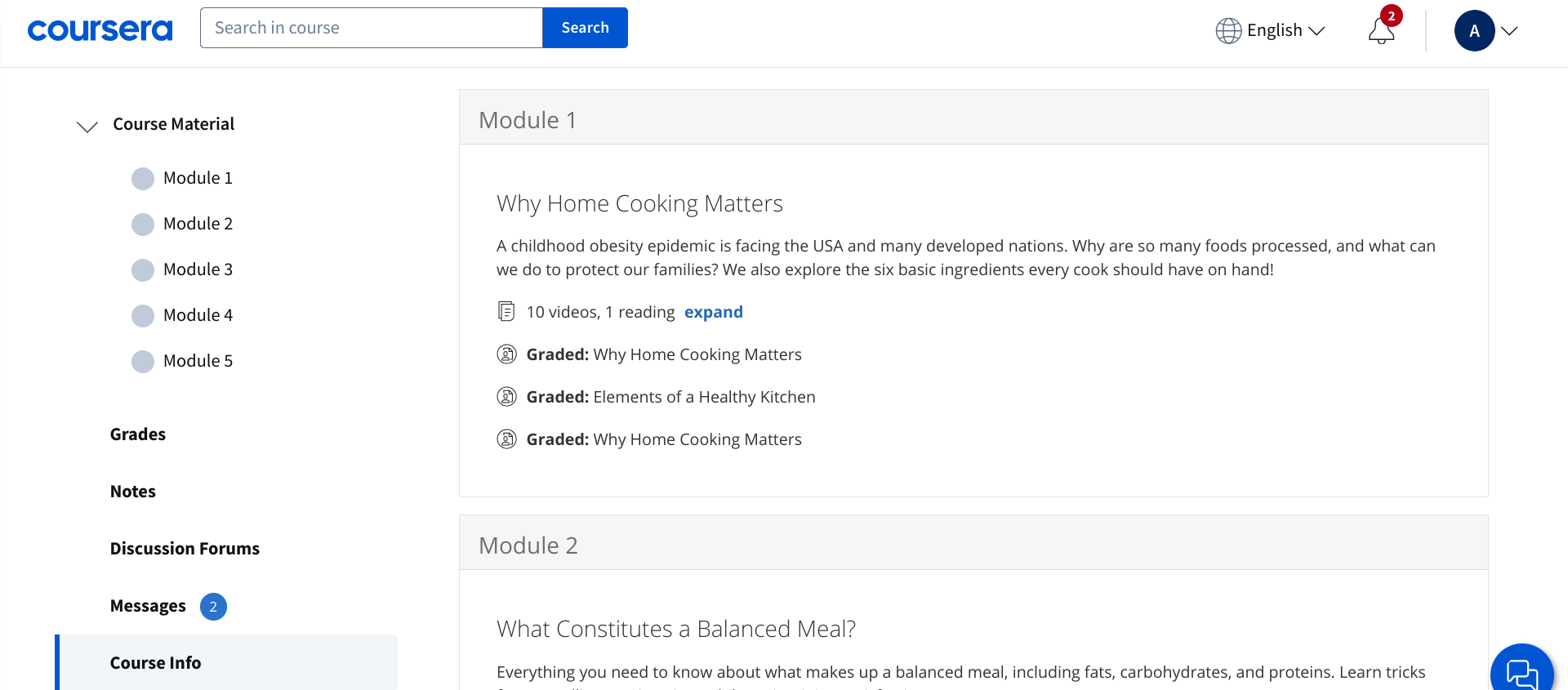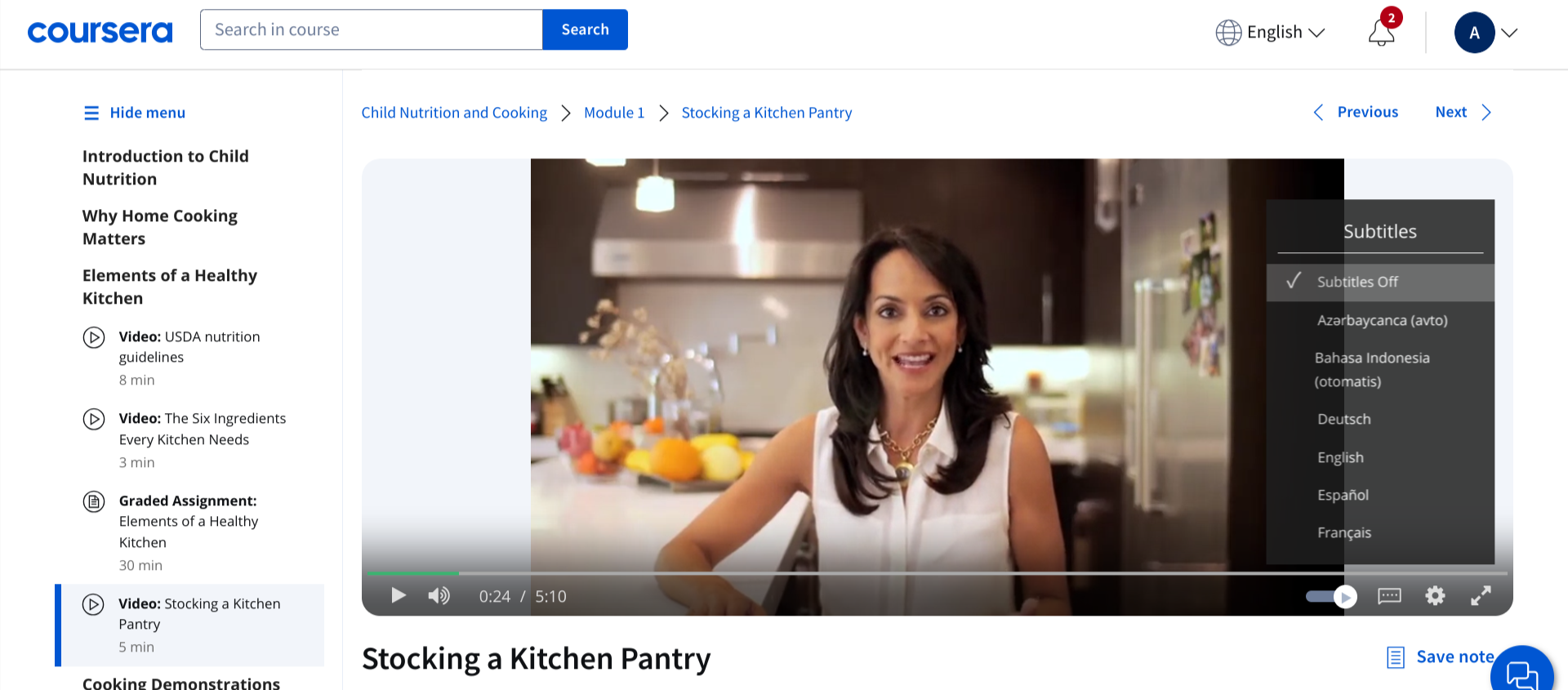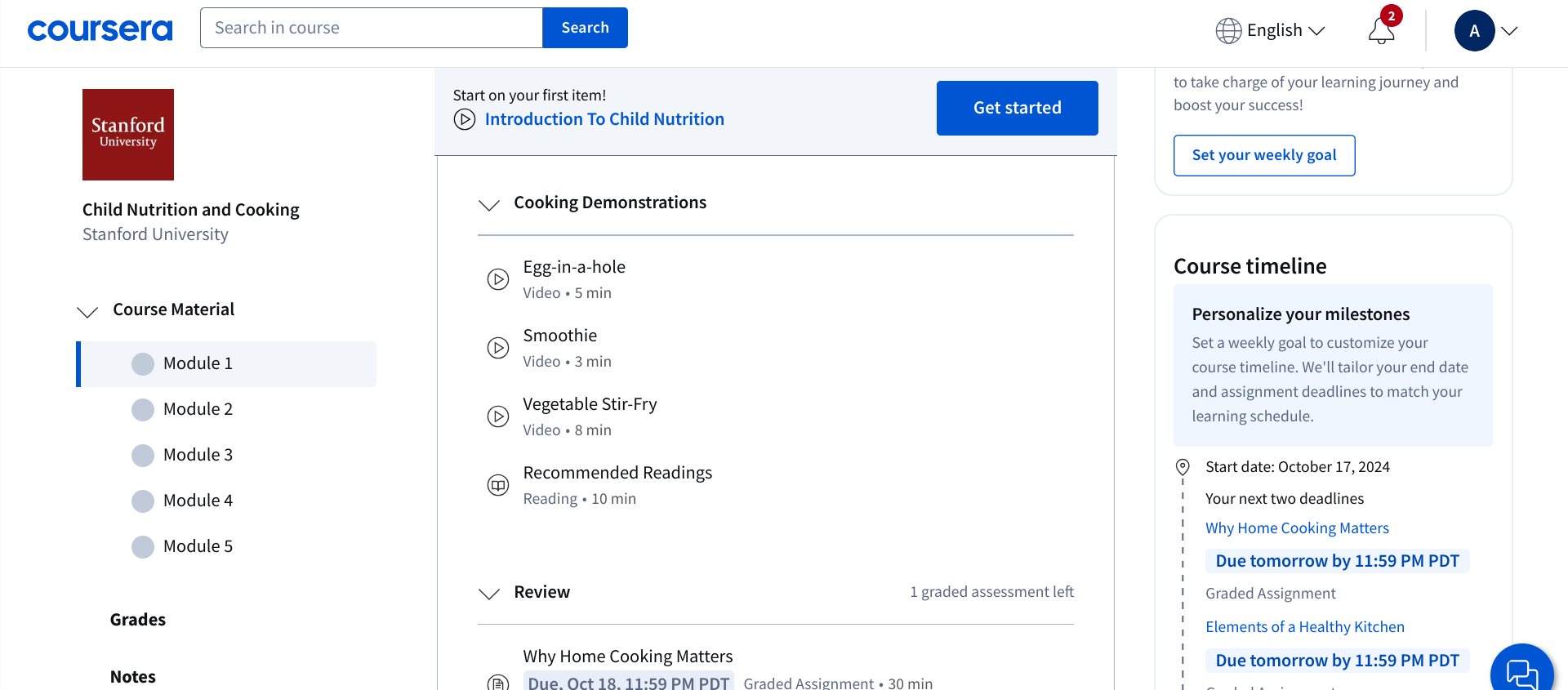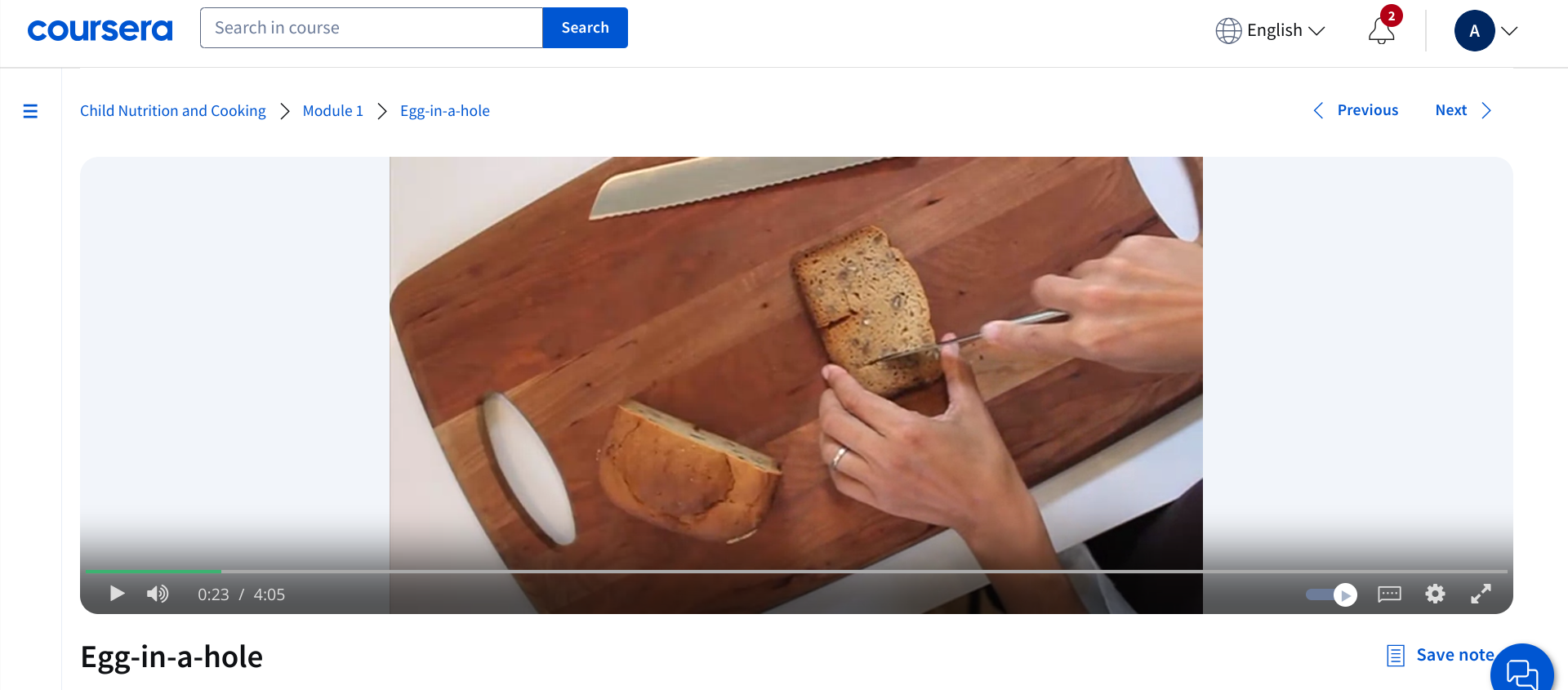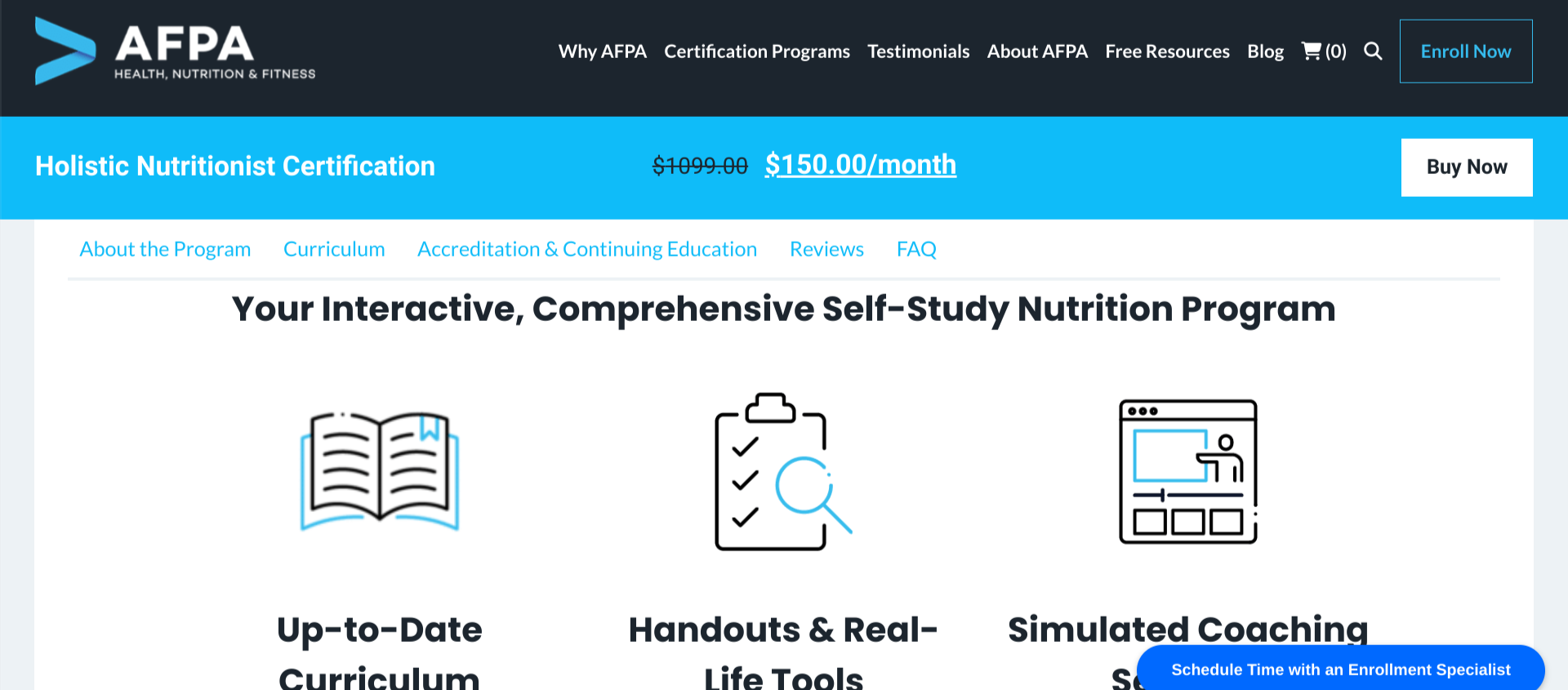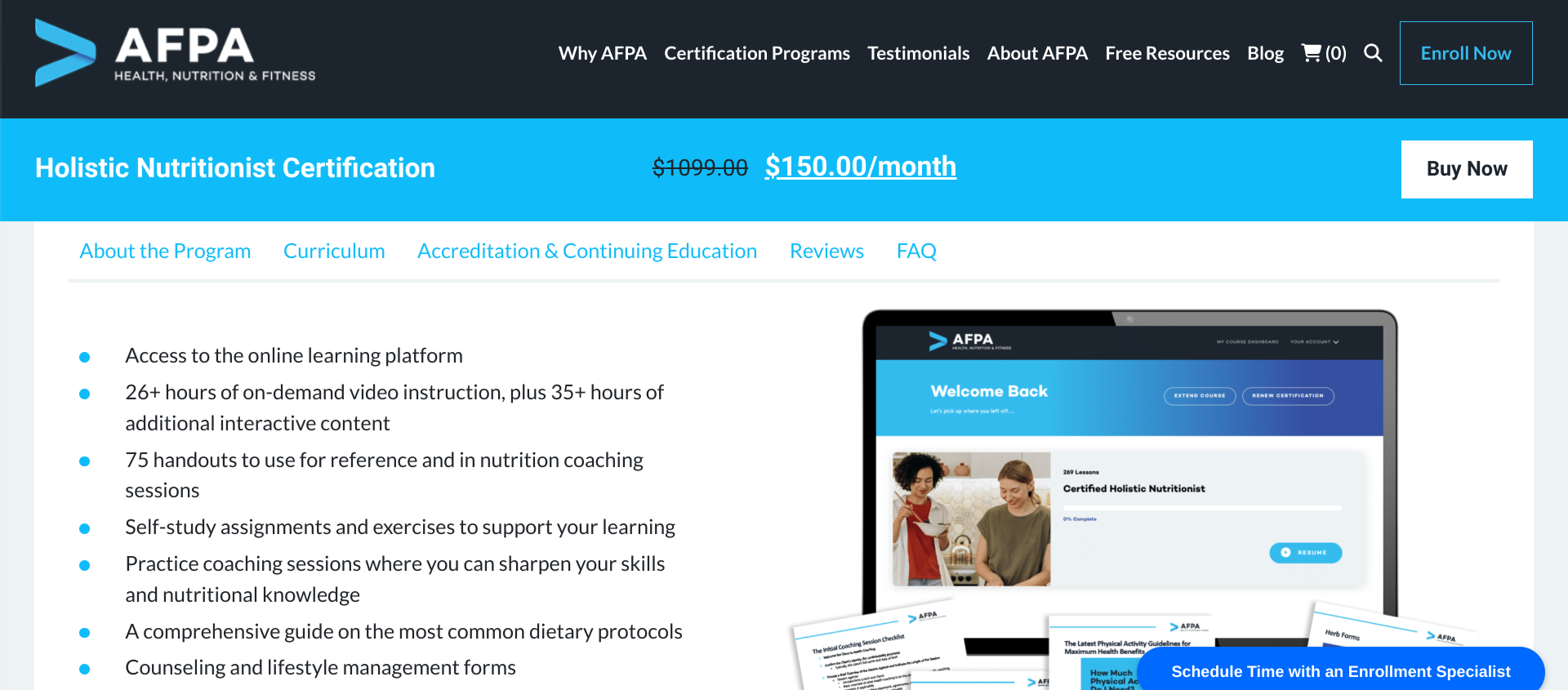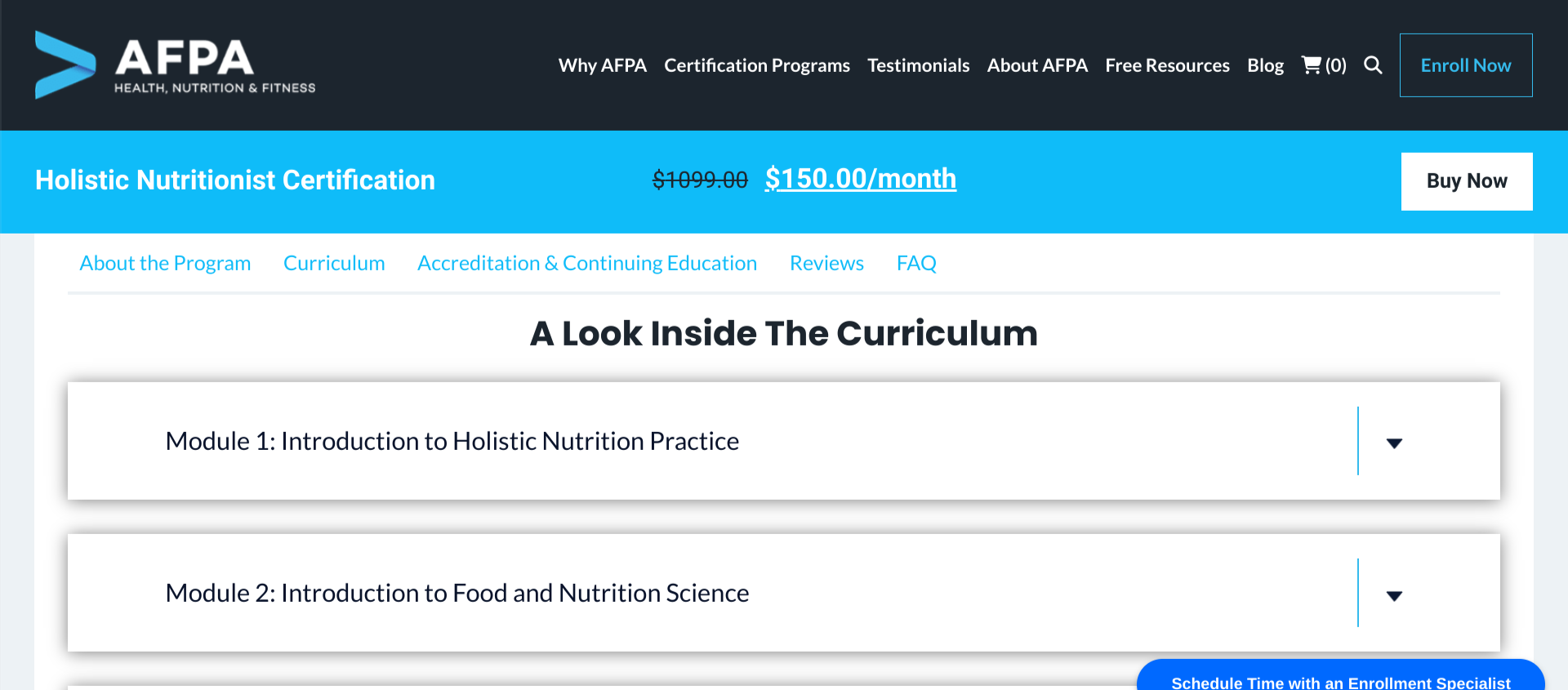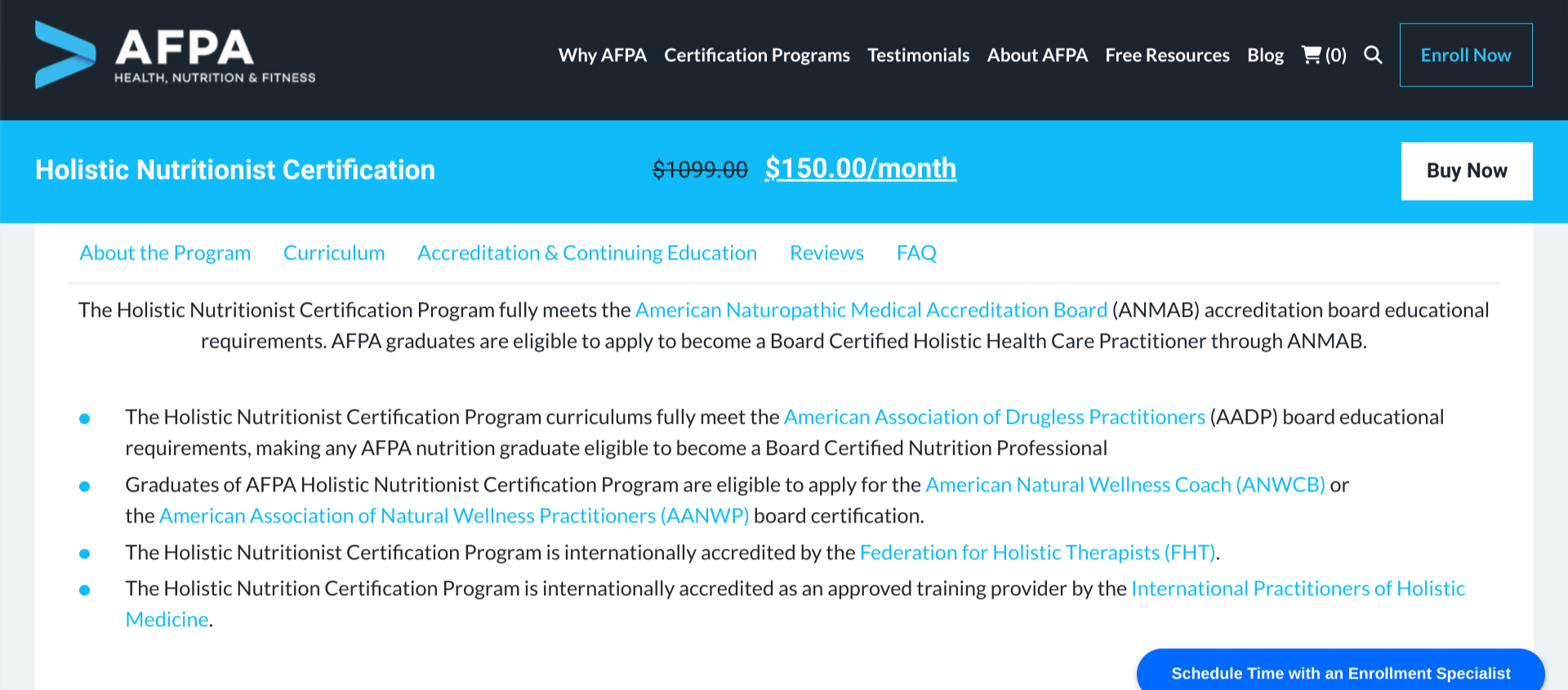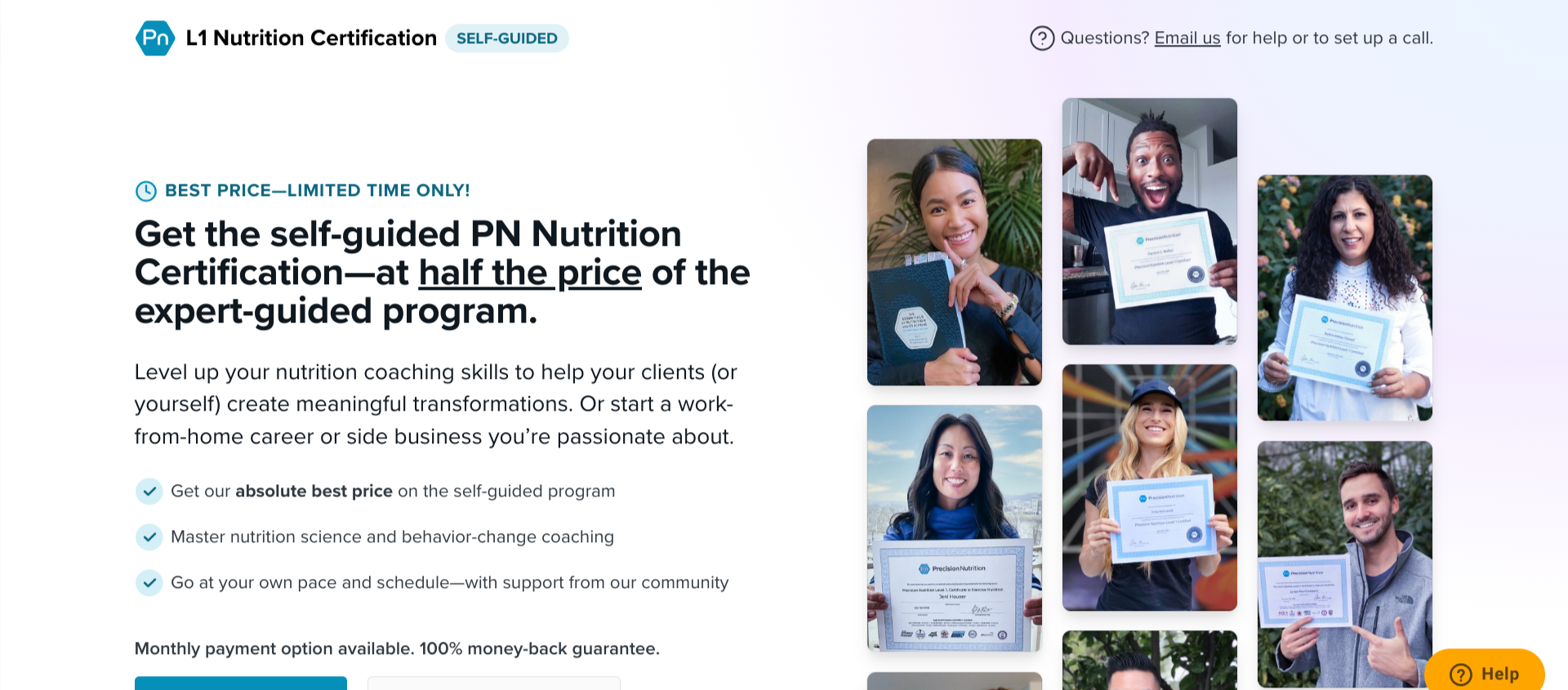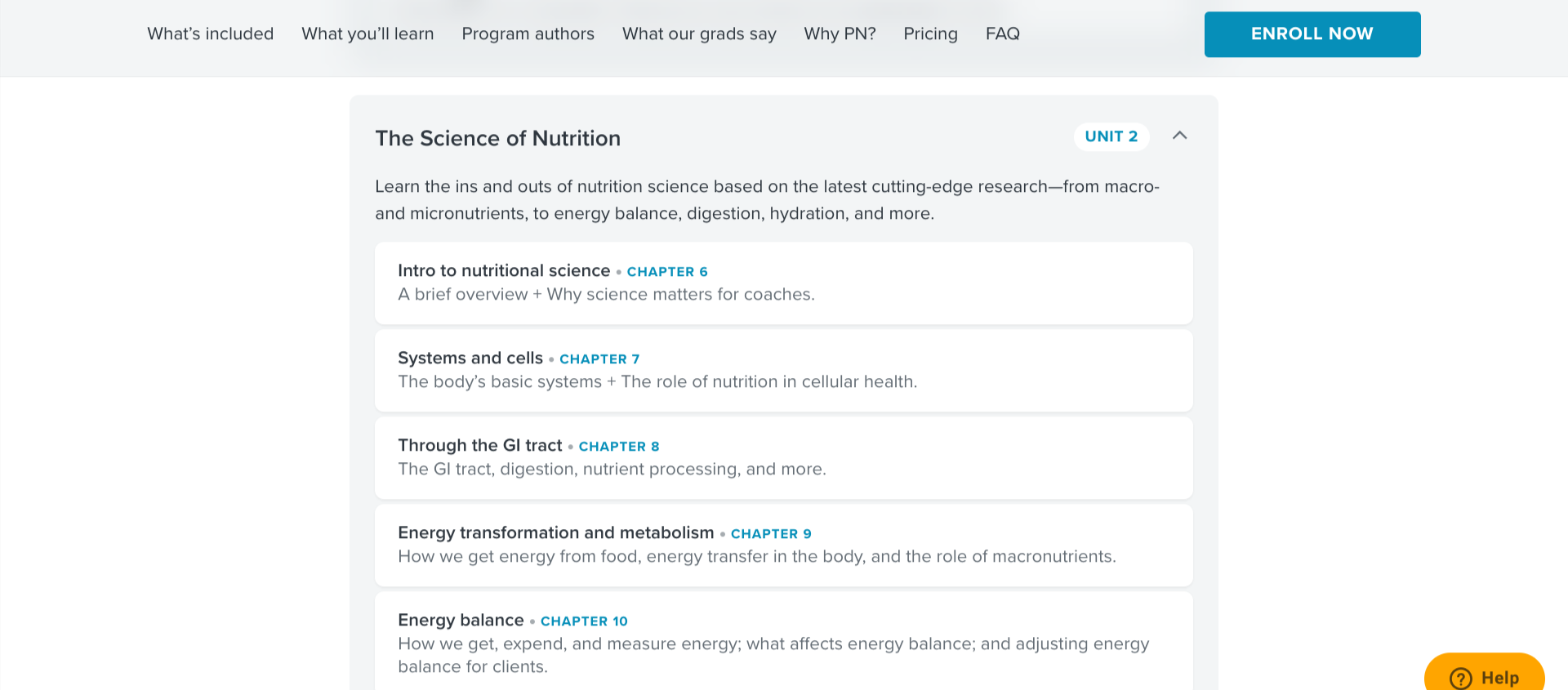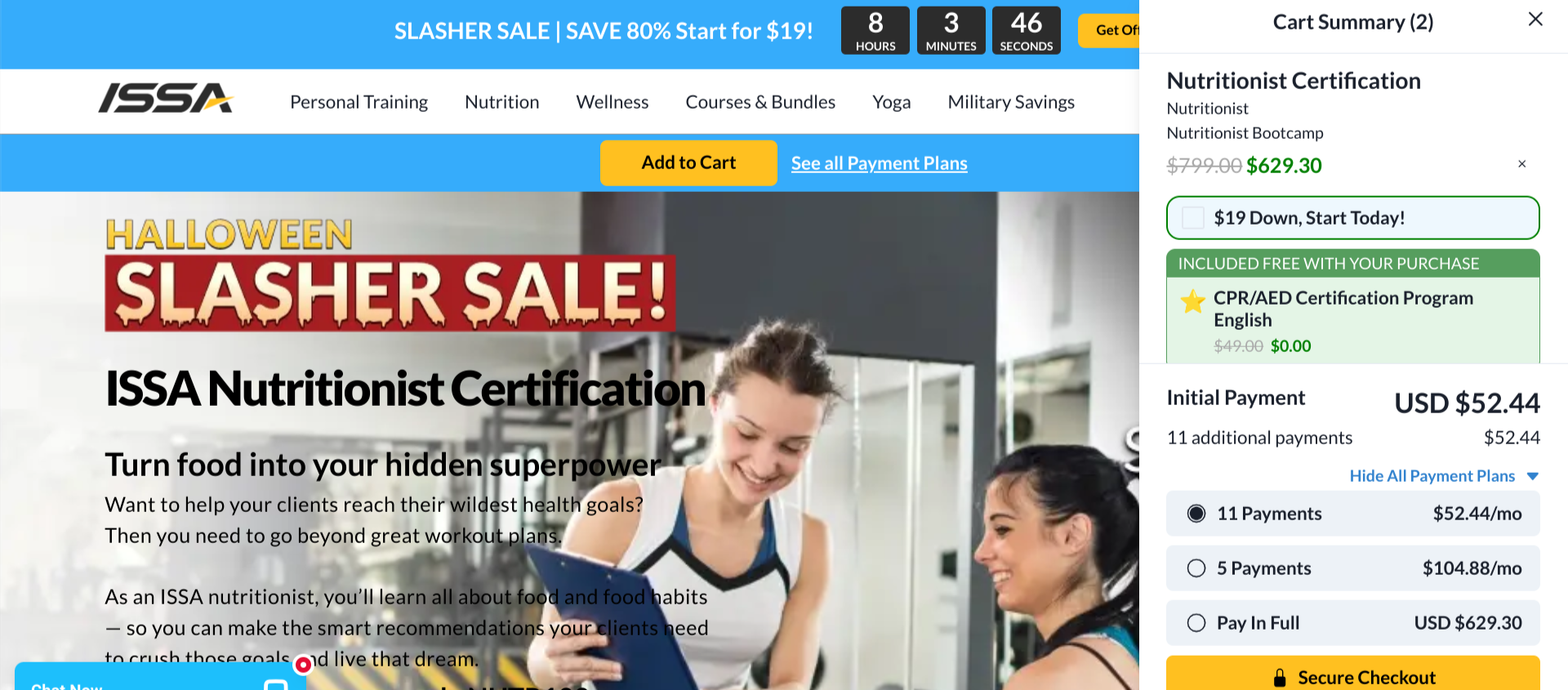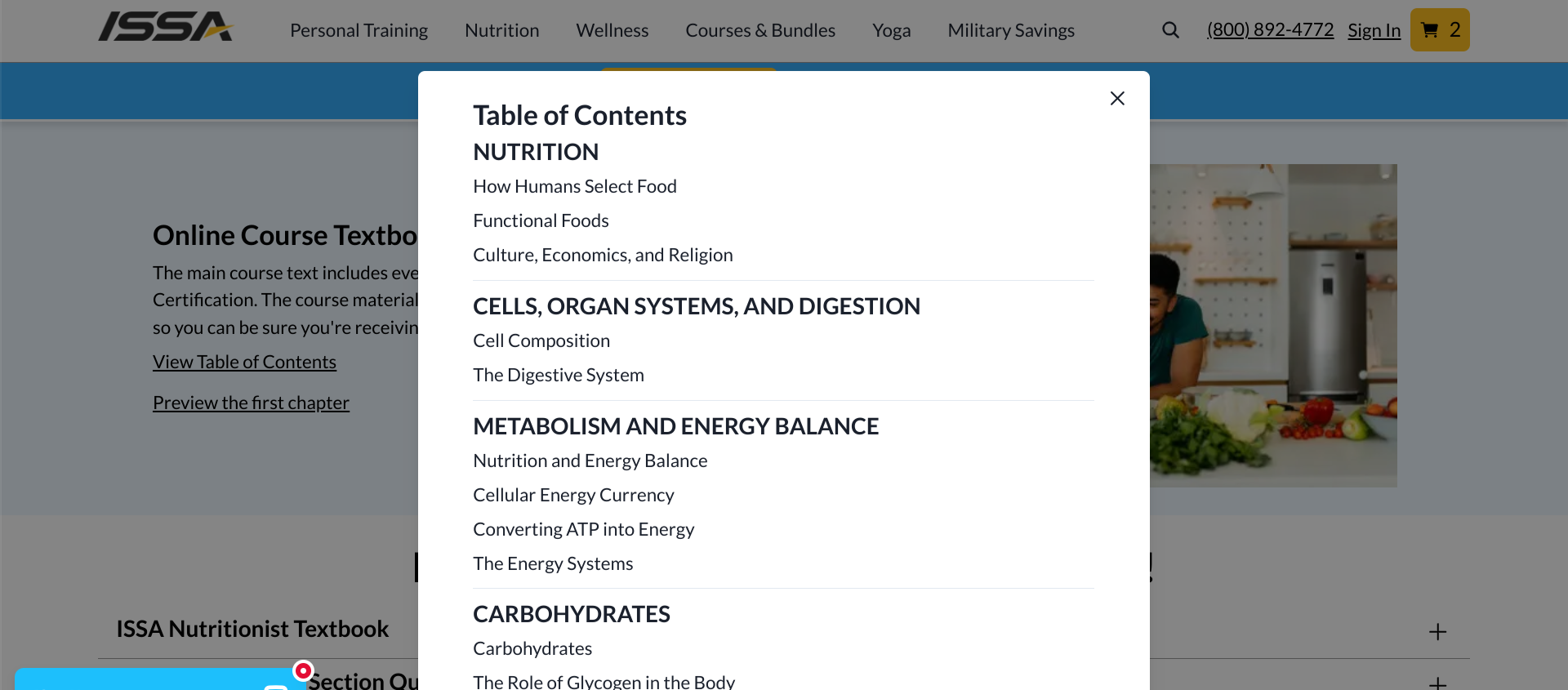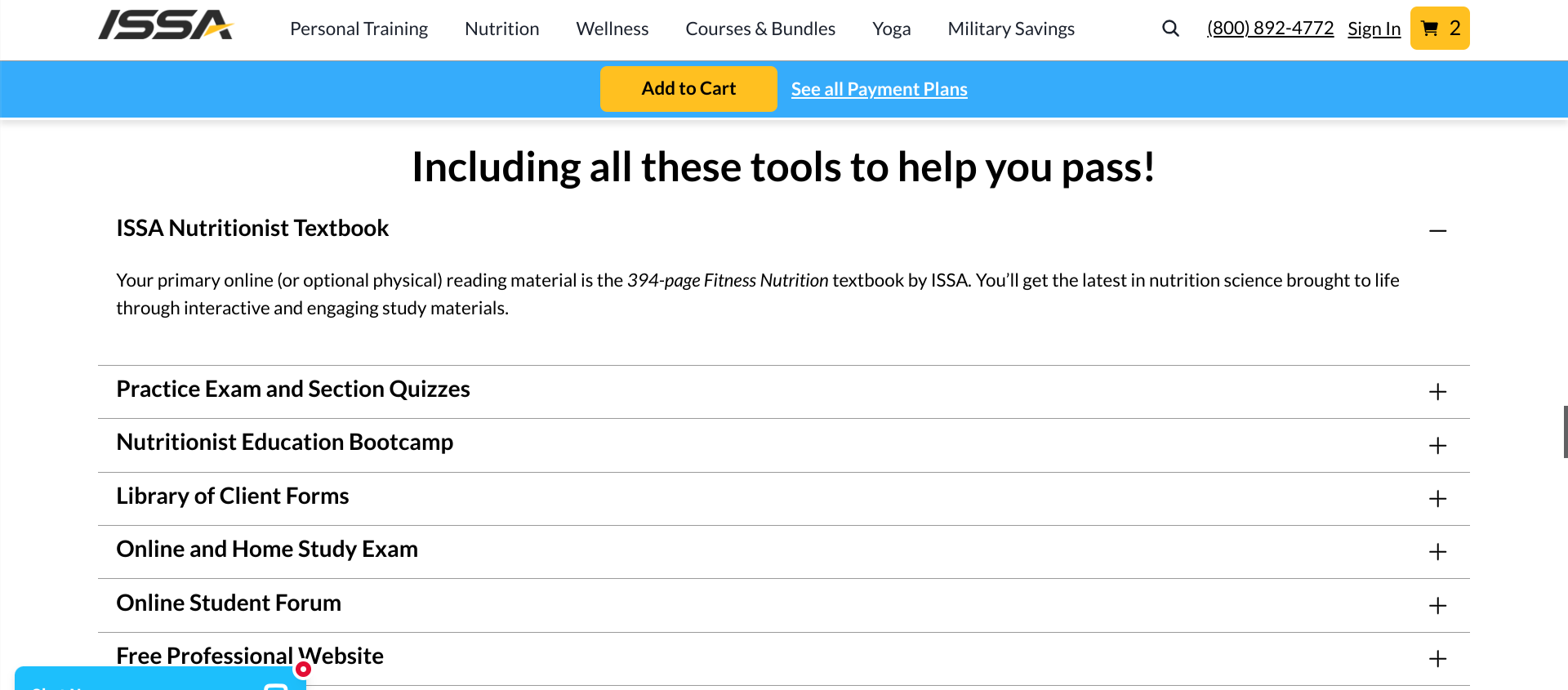Taking an online nutrition certification can be beneficial for several reasons, ranging from improving personal eating habits to preparing for careers as health and wellness coaches and personal trainers. The best online nutrition courses provide comprehensive knowledge and skills about food, health, cooking, and more within a specific context. We created this list of the best online nutrition certifications based on the various subtopics within the area so you can find a quality course that suits your needs.
Top 5 Online Nutrition Certifications
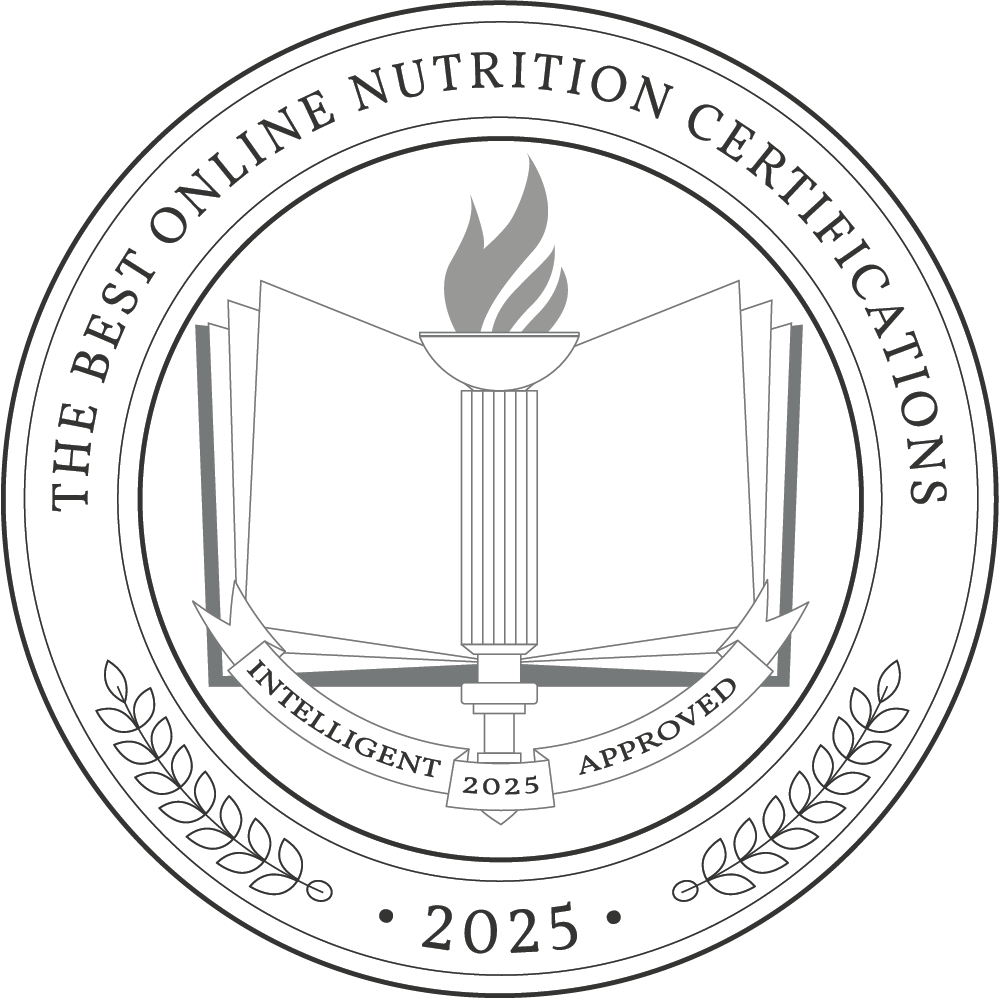
- Stanford University via Coursera – Introduction to Food & Health — Best for Beginners
- Stanford University via Coursera – Child Nutrition & Cooking — Best for Child Nutrition
- American Fitness Professionals & Associates (AFPA) –
- Holistic Nutritionist Certification — Best Holistic Nutrition Program
- Precision Nutrition – Level 1 Nutrition Coaching Certification — Best for Professional Development
- International Sports Sciences Association – Nutrition Certification — Best Budget-Friendly Course
How We Chose the Best Online Nutrition Certifications
Our top picks of the best online nutrition certifications started with a list of over a dozen online nutrition certifications and courses. We did a deep dive into the specifics of each of these courses, including their course content, delivery method, length, pacing, price, and more.
Our evaluation process included the following:
- In-depth review of the course’s content, including reading materials, videos, syllabi and curriculums, assignments, evaluation methods, and more
- Research into who develops and teaches the courses
- Analysis of student reviews and comments on third-party review sites
- For professional development courses, we verified that they provide industry-recognized certificates that can help students further their careers.
To be included on our list, online nutrition certifications had to meet the following criteria:
Flexibility and accessibility
A key reason that many individuals choose to complete an online nutrition certification course is so they can fit their coursework into their daily lives. We sought self-paced and asynchronous courses, allowing students maximum flexibility when and where to study and complete assignments. We also looked for courses with flexible enrollment dates, so if you’re ready to start your online nutrition certification journey now, you can start learning immediately.
Specialization and focus
There are many angles from which you can approach nutrition education. Some students may want to learn more about the topic to make better food choices for themselves and their families. Others may consider careers as dieticians or nutritionists or want to incorporate nutrition coaching into an existing personal training program. We looked for courses targeting specific individual needs and interests to make our list as helpful as possible. For example, certifications from organizations like AFPA and ISSA are designed explicitly for fitness coaches, while Stanford University’s Child Nutrition and Cooking course is geared toward families.
Value
We want students to get the most for their money, so we also looked at how much online nutrition courses cost and what you get for that price. The general audience courses on our list tend to be the least expensive. Courses offered through Coursera are $39 each and can be completed for free if students don’t want a completion certificate. While professional development courses through organizations like AFPA and ISSA cost a few hundred dollars, they can be considered a return on investment for individuals pursuing careers in the health and wellness or fitness industries.
Student satisfaction
We didn’t just rely on our internal course reviews to narrow our list of picks. We also examined what current and former students had to say about online nutrition certification courses. This helped inform our decisions about which courses should be included on our list and how they should be categorized. For example, based on reviews that said course content was rather basic, we chose Stanford University’s Introduction to Food & Health as our pick for the most beginner-friendly course. We removed certifications with limited or poor reviews from our final list of options.
Top 5 Online Nutrition Certificates
Stanford University via Coursera — Introduction to Food & Health

Intelligent Award: Best for Beginners
Taught by Dr. Maya Adam and available through the online education platform Coursera, the Stanford Introduction to Food and Health course provides a basic overview of how the food we eat can affect our physical and mental health. The course was designed to counter the poor nutrition habits that have led to a global crisis of obesity, type 2 diabetes, and other nutrition-related diseases and empower individuals to make healthier choices about their diet.
What We Like
This course is an excellent place to start for individuals with little background knowledge about nutrition but who want to learn about healthy eating habits. It uses short, engaging videos featuring course creator and nutrition expert Dr. Maya Adam.
Over five modules, the class covers fundamental topics, including how nutrients function in the human body, the role highly processed foods play in developing diseases like diabetes, how to choose healthy and sustainable foods, and more. It also includes cooking demonstrations and tips for planning and preparing nutritional meals.
We also like how accessible this course is. Completing all the modules takes about six hours, which makes it easy to fit into a busy schedule. Coursera allows students to audit the course for free. The paid version, which includes a certificate of completion, is just $39. It’s also available with subtitles in various languages, including Spanish, Arabic, Korean, and Japanese.
What We Didn’t Like
Depending on your level of nutrition knowledge, this course may be too simple for you. Individuals who choose this course because of the prestige of the Stanford name should know that the content and instruction style are geared towards a general audience and may be more simplistic than expected from a university course. Also, be aware that although students receive a certificate at the end of the course, it’s a completion certificate that doesn’t lead to professional credentials.
What Students Are Saying
There are over 32,000 reviews from this course on its Coursera page, 80% of which are five stars. According to satisfied students, the course provides valuable fundamental knowledge about the relationship between food and health and preparing healthy meals. Reviewers also praised the course instructor’s engaging presentation style. However, others critiqued the course for being too basic and focusing too much on Western eating habits.
Stanford University via Coursera — Child Nutrition & Cooking

Intelligent Award: Best for Child Nutrition
Ensuring that children eat nutritious food and learn healthy eating habits is a significant concern for many raising kids. This course is available through Coursera and is also taught by Dr. Maya Adam. It is designed to help kids and adults understand how nutrients function in the body and how eating a healthy diet can affect their health throughout their entire lifespan.
What We Like
This course approaches nutrition from the whole family’s perspective, including determining what’s in a balanced meal, planning meals, shopping for quick, healthy meals, and recognizing food allergies and changing tastes. The goal is to empower adults to teach kids healthy eating habits from an early age.
This course engages its audience through cooking demonstration videos, which provide students with recipes and opportunities to connect with family through food and nourishment.
We also like that this is a fast-paced course, taking about 11 total hours to complete the course’s five modules. As a video-based course, all learning is asynchronous, allowing students to set their own schedule for when and how they complete lessons and quizzes. This course is available through Coursera, and students can audit the class for free or pay $39 to receive a course completion certificate.
What We Didn’t Like
As a beginner-level course, Child Nutrition & Cooking may be too basic for individuals with some background knowledge or experience with the topic. Although the course is offered through Stanford University and taught by a Stanford instructor, the tone and delivery are for a general audience. Additionally, although a certificate of completion for the course is available, students should know that this course is designed more for personal knowledge than career advancement.
What Students Are Saying
This course has more than 10,000 learner reviews on Coursera and an overall 4.8-star rating. As one student writes, “I’ve taken nutrition classes before. This one is well done and manages to be scientifically based, yet the material is presented in an approachable way.” The most common negative feedback is that the course is too basic and includes too much information that students already know.
American Fitness Professionals & Associates — Holistic Nutrition Certificate

Intelligent Award: Best Holistic Nutrition Program
Since 1994, American Fitness Professionals and Associates (AFPA) has been educating fitness and health professionals in various areas, including nutrition. Their holistic nutrition certification is ideal for health coaches and personal trainers who want to incorporate comprehensive nutrition education into their practice with clients. This fully online, self-paced program offers a deep dive into concepts like metabolism, nutrition and the life cycle, and nutrition counseling to prepare students to become more well-rounded coaches and trainers.
What We Like
Holistic nutrition is rooted in the belief that what individuals eat affects every aspect of their well-being, including physical, mental, and emotional health. While AFPA’s Holistic Nutrition certificate is best suited for health and fitness professionals who want to offer holistic nutrition services to clients, this course is open to anyone 18 years or older who understands the English language.
We like that this program addresses different learning styles by delivering content in a variety of ways, including video lectures, readings, practical assignments, case studies, group discussions, coaching simulations, and more. The self-paced program can be completed in as few as eight weeks, although students have access to course materials for six months.
Several professional organizations recognize this program, including the American Association of Drugless Practitioners and the American Association of Natural Wellness Practitioners.
What We Didn’t Like
One key drawback of AFPA’s Holistic Nutrition certification program is that its self-paced, asynchronous design gives students little opportunity for interaction with instructors. The organization has “education specialists” available to help with questions and concerns, including any technical issues. However, students looking for a more personalized learning experience may not find what they want in this program. Also, if students need to extend their six-month subscription, there’s an additional $75 charge.
What Students Are Saying
Over 400 former students have reviewed this course, earning an average score of 4.86 out of 5. Overall, reviewers like the comprehensiveness of the course. As one student writes, “I am learning a lot of information related not only to nutrition itself but also about the agriculture and government structure and cycles around food and the impact it has on our communities.”
Precision Nutrition — Level 1 Nutrition Coaching Certification

Intelligent Award: Best for Professional Development
Precision Nutrition (PN) was founded in 2005 by Dr. John Berardi and Phil Caravaggio on the belief that everyone deserves good health and a thriving body. Since then, PN has grown into a global community offering research-driven education and professional development in nutrition, sleep, stress management, and health coaching. Their Level 1 Nutrition Coaching Certification is an ideal program for fitness and health professionals ready to take their careers to the next level.
What We Like
Like many online nutrition certifications on our list, PN’s Level 1 Nutrition Coaching Certification offers a comprehensive curriculum that covers basics like micro- and macronutrients, metabolism, energy balance, and more.
Where PN stands out is its emphasis on professional development for individuals seeking to build their own coaching practices. The Level 1 Nutrition Coaching Certification program includes unique information and opportunities, including lessons on creating social media content and a “How to Attract Coaching Clients” course. PN offers networking opportunities in the form of job interviews with health and fitness companies for qualifying students in the U.S., as well as their global network of instructors and alums.
The self-paced course consists of three modules: The Precision Nutrition Approach, The Science of Nutrition, and Working Through the PN Coaching Process. Teaching tools for this program include textbooks, animated videos, and assessment forms that students can use with clients.
What We Didn’t Like
PN’s nutrition certification differs from other programs on our list in that it focuses on teaching a particular health and wellness coaching method. While the program is open to students of all backgrounds, it’s designed for individuals who want to create or grow a coaching business. This may mean the program is not suitable for all students, especially those more interested in learning about nutrition from a personal health standpoint.
What Students Are Saying
According to Precision Nutrition’s site reviews, students like this course because of its holistic approach to nutrition and wellness and quality instructional materials. One student said, “The course is comprehensive and systematic and reinforces ideas and strategies throughout the curriculum that help retain ideas. The Facebook group that discusses real-life experiences of coaches is probably the biggest asset of doing the program.”
International Sports Sciences Association — Nutritionist Certification

Intelligent Award – Best Value
The International Sports Sciences Association (ISSA) mission is to make healthy living more accessible to people around the world through education and community. A key way they support this mission is by offering affordable training to health and wellness professionals in areas like nutrition. Their Nutritionist Certification program is a budget-friendly option for individuals looking to enter or advance their careers in the health and wellness space.
What We Like
For a relatively affordable price, students are provided with a plethora of resources, including ISSA’s textbook, either in digital or print format, a practice exam, quizzes, and a five-week bootcamp featuring live study tutorials and access to ISSA’s expert nutritionist coaches.
ISSA’s curriculum covers the foundational and advanced concepts of nutrition coaching, including macro- and micronutrients, addressing dieting myths and fads, understanding product labels, and how to coach clients through lifestyle and behavioral changes.
For European students, ISSA’s Nutritionist Certification program is approved by the European Register of Exercise Professionals, an independent organization for instructors, teachers, and trainers working in the European fitness industry.
What We Didn’t Like
As with Precision Nutrition’s certificate program, students should be mindful that ISSA’s Nutritionist Certification is as much about professional development as a health and wellness coach as it is about nutrition. Students don’t need to have a specific background in coaching to enroll in the program. Still, if they are seeking nutrition and food science education for personal information purposes, this course contains information that may not be relevant to them.
What Students Are Saying
ISSA has 4.6 stars on Trustpilot, with more than 14,000 reviews. Students praise the organization for providing accessible, flexible education opportunities and career preparation. According to one review, “The course contains so much information. It breaks everything down, from the body’s biology to the chemistry of nutrition. It’s really easy to comprehend and understand.”
What to Consider Before Signing Up for an Online Nutrition Certificate
Your education and career goals
As demonstrated by our list, nutrition isn’t a one-size-fits-all educational path. Therefore, you should first consider why you wish to pursue a certificate in nutrition online. Your personal and professional goals will help guide you toward the type of program right for you. For example, suppose you want to study nutrition from a personal health perspective or gain additional skills to add to a nutrition coach or personal trainer practice. In that case, an online certificate should be sufficient. However, to become a registered dietician or licensed nutritionist, you’ll need a traditional two- or four-year degree.
Your background
This consideration is connected to your education and career goals. What nutrition knowledge and experience do you already have? Are you looking for an introduction to nutrition principles and practices to improve personal health or explore a possible career path? Or are you looking to expand on foundational knowledge you already have? While most of the courses on our list don’t require prerequisites, some programs may expect students to have basic knowledge of food science. Other programs may be too fundamental for students with some nutrition experience.
Your budget
How much can you spend on your online nutrition certificate? Programs are available at a range of price points, including free, although it’s important to look closely at what you’re getting for what you’re paying. In most cases, free courses don’t include an official certificate of completion. If receiving a certificate is essential, be prepared to pay a fee. Also, professional development programs like those offered through ISSA and AFPA tend to be more expensive. Tuition for these programs is usually over $1000 but may be a worthwhile investment for individuals building careers as trainers and health coaches.
Your availability
How much time and energy do you have to devote to an online nutrition course? Can you commit to scheduled class meetings, or would a self-paced program work better for your life? Being honest with yourself about how much time you can realistically devote to an online course greatly improves your chances of completing it. The good news is that online nutrition certificate courses come in various lengths. Students can complete Stanford’s Introduction to Food and Health in about six hours. Other programs may take significantly longer, particularly those geared toward professional development.
Career Outlook for Nutrition
Online nutrition courses can prepare aspiring nutrition specialists for related degree programs or can help current professionals boost their professional prospects by educating them on new industry-leading knowledge and strategies. Below are jobs related to nutrition:
Registered dietitian
Dietitians use their nutritional expertise to advise clients on how to improve their health and manage disease through healthy eating habits. Based on their evaluation of patients, dietitians develop individual intervention plans with suggestions for behavioral modifications, including which foods to eat or avoid. Found in places like hospitals and long-term care clinics to nonprofits, these professionals often participate in community presentations and food service programs. The U.S. Bureau of Labor Statistics reports a median annual salary of $69,680 for registered dietitians.
Food scientist
Food scientists use chemistry, biology, and other sciences to investigate the nutritional value of foods, discover new food sources, and develop methods for ensuring processed foods are safe and healthy. They also strive to improve food by identifying ways to enhance its flavor, increase its shelf life, and boost its health benefits. Food scientists may also apply their research in product development by assisting in the improvement of preserving, processing methods (canning, storing, etc.), packaging, or distributing food. Food scientists earn a median salary of $76,400.
Nutrition educator
Nutrition educators use classes, seminars, and social media to teach people about the benefits of healthy foods and a balanced diet. Nutrition lovers who fill this role typically provide food education programs and policies for audiences at hospitals, schools, food banks, mother and infant programs, etc. They may also create meal planning and dietary goals for individuals at high risk of heart disease or type 2 diabetes. Nutrition educators in the United States make an average of $60,734 annually, but it can range from approximately $34,000 to $75,000.
Sports nutritionist
Sports nutritionists provide individuals and groups with advice regarding optimal nutrition for healthy and natural enhancement of sports performance, training, hydration, recovery, etc. Although some sports nutritionists work in private practice or fitness clubs, other employers can include children’s sports clinics or organizations like the NBA or NFL. Though salaries vary widely based on employer and geographic location, sports nutritionists make a median annual salary of $71,542, according to Salary.com.
Holistic health coach
A holistic health coach is a trained professional who uses an integrative approach to both diet and lifestyle changes to improve their clients’ health. Working as a guide toward an overall healthier life, they will look at their clients’ nutrition patterns, relationships, physical fitness, spirituality, and more. They then use this information to create and implement effective solutions to improve their client’s overall health and wellness. The average salary for health and wellness coaches in the United States is $65,600, according to Salary.com.
Educational requirements for careers in nutrition
Though many nutrition-related careers — like registered dietitians or food scientists — require a bachelor’s or master’s degree along with various certifications, licensing, and supervised experience, some roles, like health and wellness coaching, only need minimal education and a recommended certification that can be earned by completing a self-study program and sitting for an exam. Individuals with a passion for nutrition but who don’t hold a degree may also be interested in pursuing the role of a nutritionist, which pays less than an official dietician yet allows one to provide similar services with knowledge one can gain through online courses and optional certifications.
Frequently Asked Questions About Online Nutrition Certifications
What jobs can I get after completing an online nutrition certificate?
It depends on what type of online nutrition certificate you complete. An introductory-level nutrition and food science course likely won’t provide enough training to lead to new job opportunities. Most online certificate programs prepare students for employment as nutrition coaches or consultants. Many individuals incorporate these skills into practices as fitness coaches, personal trainers, health and wellness coaches, and more. However, certain nutrition jobs, including registered dieticians, licensed nutritionists, and dietetic technicians, require bachelor’s or master’s level education and aren’t open to students who only complete online certificate programs.
Are there free online nutrition certificates?
There are free online nutrition classes. However, in most cases, students enrolled in free classes only get the course learning materials. Most companies charge fees for certificates documenting their completion of the course. Students should also be aware that, in most cases, free courses feature only basic information and provide little interaction with instructors. Generally, if you wish to take a class where you can ask questions and interact with your peers or faculty, there will be a cost involved.
How long is the average online nutrition certificate?
It depends on the type of course and course provider. Most online nutrition certificate programs offered by professional organizations like ISSA and AFPA take several months to complete. Meanwhile, students can complete introductory-level courses in a few weeks. Since most classes are offered on flexible schedules, you can complete them on a timetable that works for you. Remember that in addition to lectures you’ll be watching or reading, you may also have exercises to complete, which take additional time.
What is the best online nutrition course?
The honest answer is the best online nutrition course is the one that suits your needs in terms of learning goals, content, delivery method, and cost. With so many nutrition courses available, you can likely find one that meets your needs and offers a high-quality nutrition education. We structured our list to recommend the strongest online nutrition courses tailored to a variety of learning and career goals.
Can you become a certified nutritionist online?
Technically, yes, but it’s important to keep in mind that there’s a difference between being a certified nutritionist and being a licensed or registered nutritionist or dietician. To obtain licensure, students must complete a bachelor’s or master’s degree in nutrition science or a related field. Online certificates do not provide licensure or registration, which can potentially limit your employment opportunities. However, an online certificate program can be an affordable, accessible way to learn more about nutrition and help you decide whether to pursue a full degree in the field.

